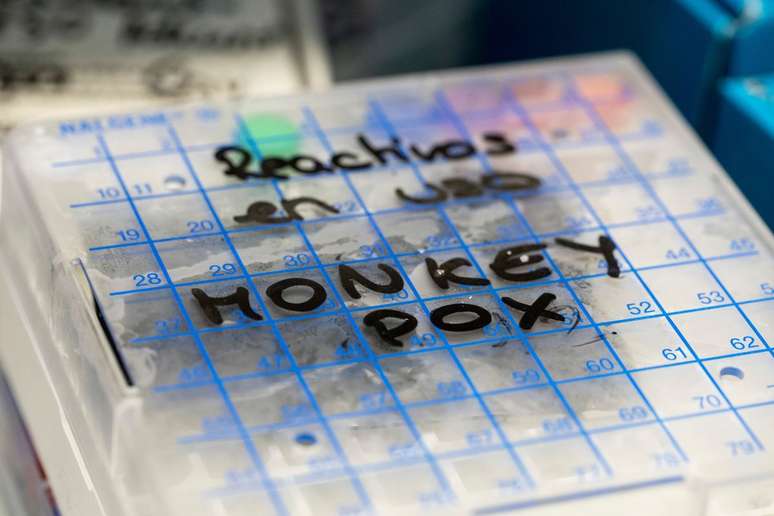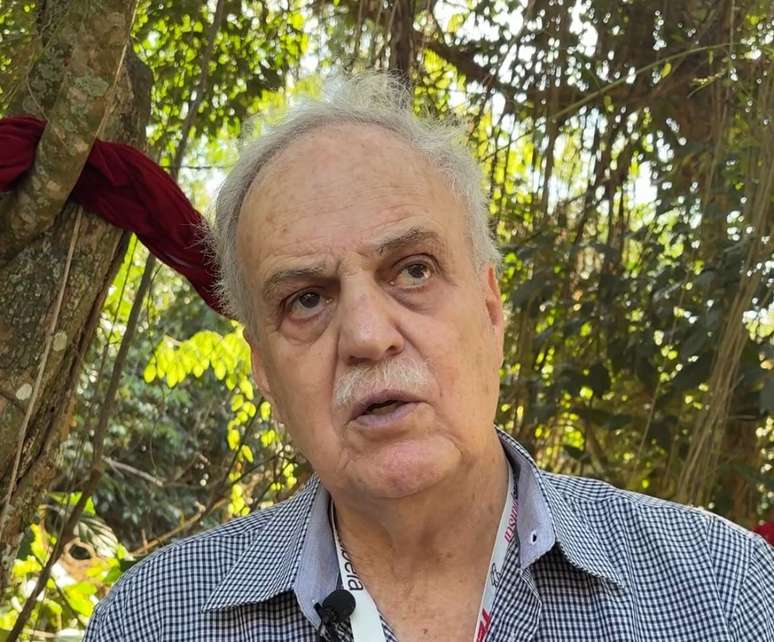The study also highlighted the fatal outcome of patients with suspected clinical deterioration due to immune reconstitution syndrome (Iris), an inflammatory condition that can occur after initiation of antiretroviral therapy.
html[data-range=”xlarge”] figure image img.img-3fc5314e23d8e3e1ac1423f34f64e109w97q4y11 { width: 774px; height: 516px; }HTML[data-range=”large”] figure image img.img-3fc5314e23d8e3e1ac1423f34f64e109w97q4y11 { width: 548px; height: 365px; }HTML[data-range=”small”] figure image img.img-3fc5314e23d8e3e1ac1423f34f64e109w97q4y11, html[data-range=”medium”] figure figure img.img-3fc5314e23d8e3e1ac1423f34f64e109w97q4y11 { width: 564px; height: 376px; }
An international survey, with the participation of the Evandro Chagas National Institute of Infectious Diseases (INI), the Oswaldo Cruz Foundation (Fiocruz), indicated the need to evaluate the inclusion of severe forms of monkeypox as a new AIDS-defining condition in the classifications of HIV diseases by the US Centers for Disease Control and Prevention (CDC) and the World Health Organization (WHO).

The work was carried out by researchers from 19 countries, including the United States, Spain, Mexico, the United Kingdom and Brazil. They collected data from confirmed cases of monkeypox (Mpox, also called monkeypox) between May 11, 2022 and January 18, 2023, for a study evaluating cases in people with advanced HIV infection. The INI/Fiocruz, which is the reference to assist the cases of Mpox in Rio de Janeiro, develops research that contributes to the fight against this disease.
The study also highlighted the fatal outcome of patients with suspected clinical deterioration due to immune reconstitution syndrome (Iris), an inflammatory condition that can occur after initiation of antiretroviral therapy. Of the total of 85 patients who started or resumed antiretroviral use, 25% suspected that the clinical deterioration could have occurred due to the iris and 57% of these died, which caused great concern to researchers.
In terms of prevention, research has indicated that people with HIV are at high risk of HIV infection monkeypox it should be the priority for a preventive vaccine. The work showed that two-thirds of the recorded deaths occurred in Latin America.
According to the researchers, the findings are particularly relevant for countries with low levels of HIV diagnoses or without universal free access to antiretroviral therapy or intensive care units, where the interaction between uncontrolled HIV infection and monkeypox is more prevalent. . They also stressed that a concerted effort should be made in these countries to provide urgent access to antivirals and vaccines against monkeypox.
Publication
The international work was presented at the 30th Conference on Retroviruses and Opportunistic Infections (Croi 2023 – Conference on Retroviruses and Opportunistic Infections, in free translation), which took place in February in Seattle, United States, and was published in the scientific journal The Lancet. I study Mpox in people with advanced HIV infection: a global case series (Mpox in People with Advanced HIV Infection: A Global Case Series) analyzed 382 cases, 349 of which, or 91%, involved individuals with HIV. The survey found that 107 patients (28%) were hospitalized and 27 died (25%). The deaths occurred in people who had advanced immunosuppression due to HIV.
The work highlighted the description of a severe form of monkeypoxcharacterized by necrotizing skin and mucosal lesions, with a high prevalence of fulminant dermatological and systemic manifestations and death, in patients with advanced HIV disease, characterized by TCD4+ lymphocyte counts below 200 cells/mm3. The study had the collaboration of an infectologist from the INI/Fiocruz Clinical Research Laboratory on STIs and AIDS Mayara Dry Torres Silva.
Prevention
In addition to taking care of patients with monkeypox, INI/Fiocruz carries out research to combat the disease. Among these, two multi-centre studies under the coordination of the Institute stand out, which should start next March. The first evaluates the MVA-BN Jynneos vaccine, produced by the Nordic Bavarian company, as post-exposure prophylaxis. The vaccine is given after the person has had contact with a high degree of potential exposure to the virus, through intimate contact with a person who is a confirmed case of monkeypox or who has had an accident in handling material contaminated by the virus, whether in the collection of clinical material or in the processing of material in the laboratory.
The study coordinator and director of INI/Fiocruz, Valdilea VelosoI said Fiocruz news agency that these people must attend research centers, where they will receive two doses of vaccine, with an interval of 28 days between doses, if exposure occurred in the interval of up to 14 days. People whose exposure occurred after 14 days will be able to participate in the study and will be followed up, but will not be vaccinated. The study expects the participation of at least 746 people. The expectation, according to the director, is that this immuniser, applied in the foreseen time interval, can block the infection process by the virus or attenuate the development of the disease.
The second study is called Unity. This is an international clinical study that will evaluate the safety and efficacy of the antiviral Tecovirimat in the treatment of patients with monkeypox. The study is coordinated by the researcher Beatriz Grinsztejnhead of the Clinical Research Laboratory on STIs and AIDS at INI/Fiocruz, in collaboration with Alexandra Calmyof the Hospital of the University of Geneva-Switzerland and with the French Agency for Research on AIDS, Viral Hepatitis and Emerging Diseases (ANRS).
Tecovirimat was developed for the treatment of smallpox and has been authorized by the European Medicines Agency (EMA) for the monkeypox last year based on data from limited animal and human studies. So far, however, no clinical trials have been conducted to confirm whether the drug can help patients with monkeypox to recover from the disease. The INI/Fiocruz researchers believe that the results of the Unity clinical trial will be of vital importance for clarification in this regard.
Source: Terra
Ben Stock is a lifestyle journalist and author at Gossipify. He writes about topics such as health, wellness, travel, food and home decor. He provides practical advice and inspiration to improve well-being, keeps readers up to date with latest lifestyle news and trends, known for his engaging writing style, in-depth analysis and unique perspectives.








